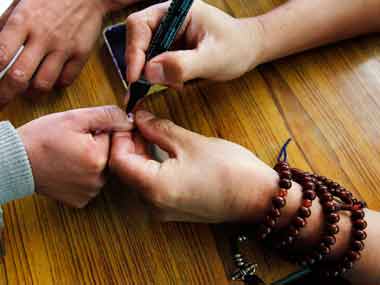Hard-selling the Internet to political parties and politicians as a means to influence voters ahead of the Lok Sabha 2014 elections, Google India on Tuesday released its survey titled ‘Urban Indian Voters’. While refusing to specify if Google India is working directly with the BJP or the Congress Party or sharing data with either, the company’s Vice President and Managing Director Rajan Anandan, speaking at a press conference, said, “Over the next couple of weeks we will share (survey findings) with not just these two parties but with others as well. There are three ways in which we engage. One is making sure that political parties are aware of what is happening with consumers and how they are using the Internet. It is really an awareness building role that we are playing. That is why we have events like these. Second, for parties that are interested there are many Google platforms they can use, be it Search, Google Hangout. Many politicians in India use Google Hangouts as a way to drive engagement, several political parties and politicians now have Youtube channels where they are able to reach out to millions of Indians. [caption id=“attachment_116140” align=“alignleft” width=“380”]  A large number of Urban voters who are online are still undecided, the survey found. Reuters[/caption] “Much like we engage with companies, we engage with political parties and with politicians that want to engage with us. Over the next several months is when we’ll really see what we are going to do….As things happen, you will see it.” Asked if Google India saw the 2014 Lok Sabha election as a financial opportunity, Anandan said, “Let me tell you where India is today. There is a miniscule amount of spending on digital media. The media spend has been focused on TV, print, outdoor and so on. We actually think that 2014 will be the first election where the Internet is going to play a very significant role, especially in urban India. In terms of how media spending will evolve, it is too early to tell.” Responding to a question on whether opinions generated on the Internet could lead to swing, Anandan said, “That we don’t know. The results show that the Internet is going to have a significant impact (on the 2014 Lok Sabha elections). Especially, given that 42 per cent (of the urban voters who use the Internet, which is 37 per cent of total urban voters) are undecided today and how thirsty they are for information, to engage.” However, when confronted with why he was so confident that 2014 Lok Sabha election would be the first election where the Internet would have a significant role, given that the survey shows that only a little over one-third of urban Indian voters (a minority in themselves) use the Internet, Anandan said, “We didn’t say we settled the question (that Internet would impact the 2014 election), we said we were looking for more detail….we have not made any conclusions one way or the other. What we have said is that, at least in urban India, Internet is a going to be force to contend. Which political parties will leverage it in interesting ways is up to them to decide.” The offline survey was conducted by market research firm TNS for Google India and covered 7042 registered voters in 65 constituencies in 59 Indian cities between July and August. According to Google India, the survey constituencies were selected “purely based on Internet traffic Google gets from across the country.” Sixty-eight per cent of the respondents, the company said, was in the age group of 18-35. No details were provided on what the income bracket or the professional backgrounds of those surveyed were. Results of the survey.
Urban Indian Voter Study 2013Releasing results of survey titled ‘Urban Indian Voters’, company says only a third of urban voters are online, but 42 per cent of them are undecided, a large number to engage with online.
Advertisement
End of Article


)
)
)
)
)
)
)
)
)



